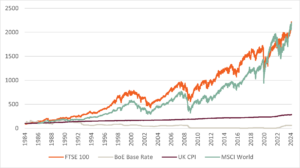Author: Adrian Brown
Chartered Financial Planner
View profile
We at MM Wealth are proud to be celebrating 40 years in business. As part of our celebrations we have been reflecting on all things MM Wealth, from starting up the business, to reviewing the regulatory framework. Reflecting over the past 40 years, Adrian Brown takes a look back at the markets and the events that have thrown some curveballs along the way.
40 years is a long time in investing. In the time that MM Wealth have been in business, we have seen some momentous market events and here is a potted history of these that have led us to our current position.
Only slightly older than MM Wealth is the FTSE 100. On 3 January 1984, the FTSE 100 was launched at a starting value of 1,000. To highlight that stock market crashes are not just a recent phenomenon, here at MM Wealth we have experienced a few in the past four decades. The first of our time was Black Monday in October 1987, where there was a severe and largely unexpected fall in global stock markets. Both the Dow Jones and the FTSE 100 dropped by around 23%.
Since then, we have seen various ‘events’ – geopolitical, financial and then those (hopefully) once in a lifetime events such as the recent COVID-19 pandemic, which caused a global market crash followed by a rapid recovery, particularly in tech stocks. Sticking to the technology theme, the dotcom bubble roots began in 1995 and burst spectacularly in 2000. Are we going to see similar with Nvidia and what have become known as the Magnificent Seven? Past performance is not a guide to future performance, but it is certainly something we are keeping an eye on.
We have experienced those events that saw markets fall and recover, in some instances, surprisingly quickly. 1991 saw the Gulf War which caused market volatility but a quick recovery. In 2001, the 9/11 attacks led to sharp market declines followed by a swift recovery. The Eurozone crisis of 2011 saw financial difficulties for some members, especially Greece.
That is not to say we had to wait for 10 years for each event. The Global Financial Crisis – 2007 to 2008 triggered by the collapse of Lehman Brothers, led to the worst recession since the Great Depression. This certainly made it an interesting time to establish our Discretionary Portfolio Management Service.
Since then, we have seen the Bank of England base rate fall from 5.75% in 2007 to 0.5% in 2009, staying low until it increased from 0.1% in November 2021, with 14 consecutive increases to 5.25% in August 2023 as an anti-inflation measure. The Bank of England made their first cut in nearly three years, by 0.25% to 5.0% on 1 August 2024.
While we were achieving Chartered firm status in 2016, the Brexit vote caused significant market volatility; although some may forget this proved a positive for UK investors in some areas of the market due to the disruption in sterling.
The 2022 Russian invasion of Ukraine triggered a surge in energy prices and escalated the global supply chain crisis which was already massively disrupted following the pandemic. While energy prices are no longer the inflationary force they were, prices remain elevated for the consumer.

Source: FTSE 100 – Morningstar & LSE, MSCI World – Morningstar,
UK CPI – Morningstar & ONS, BoE Base Rate – Bank of England.
Although the market events over the last 40 years were quite scary for investors when they occurred, the chart above shows that markets do recover to the benefit of long-term equity investors. It is interesting to note how inflation (UK CPI) and the Bank of England base rate compare to the FTSE 100 and the MSCI World index. This suggests that to achieve inflation plus returns, some exposure to equity-based investments needs to be considered.

We are always here to help you with any questions or concerns you may have. If you would like to talk to one of our Chartered Financial Planners, please contact us on 01223 233331 or email info@mmwealth.co.uk.
Contact us
Disclaimer
Opinions constitute our judgment as of this date and are subject to change without warning. The value of investments and the income from them can go down as well as up, and you may not recover the amount of your original investment.

